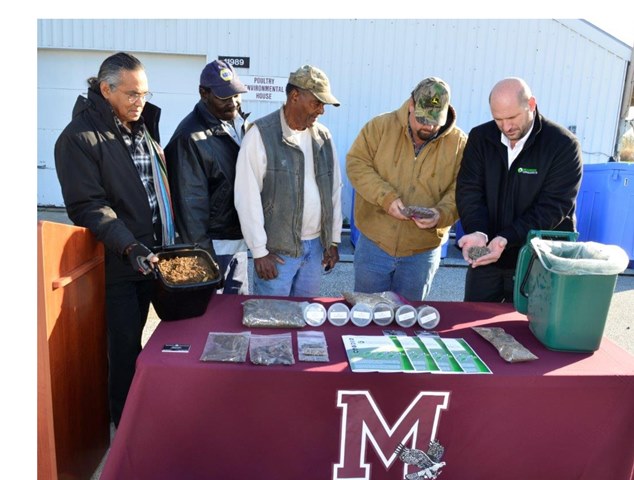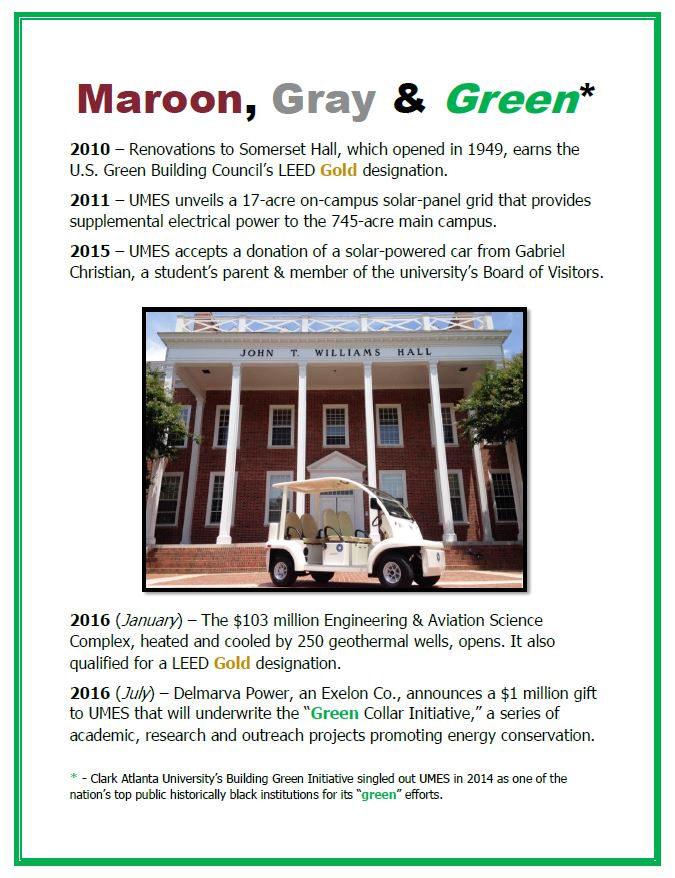
University makes America Recycles Day statement
Wednesday, November 15, 2017
Leftover food and table scraps generated across the University of Maryland Eastern Shore campus will no longer be sent to a local landfill.
Instead, the refuse will be handed over to ReGreen Organics, an up-start recycling company with a new approach to converting uneaten edibles into fuel pellets, environmentally friendly fertilizer and in some cases livestock feed.
“The patented technology employed in our machines processes all types of organic waste in minutes into bacteria-free, highly nutrient-rich solid and liquid byproducts that are practically odor free,” according to the company.
ReGreen and UMES jointly announced on “America Recycles Day” a partnership that was a year in the making and will provide the company with a source of organic refuse to launch its business in Somerset County.
UMES President Juliette B. Bell said the agreement she signed with ReGreen’s CEO, Jeffrey Camera, is an ideal fit for an 1890 land-grant university embracing its 21st century role as a steward of the environment.
“This (is) a great opportunity to be a trend-setter and at the forefront of protecting our environment,” Bell told a small group that had gathered outside the university’s Poultry Environmental House.
The venue also doubled as an important symbol reinforcing another source of organic material that ReGreen hopes to tap locally – livestock farmers, especially those who grow chickens.

Camera says ReGreen’s high-speed composting machines that it plans to bring to Somerset County can transform animal waste quickly into a slow-release fertilizer that should significantly reduce troublesome compounds blamed for pollution found in the Chesapeake Bay. Some Delmarva chicken litter is trucked out of state as a strategy to reduce harmful chemicals known to leach into water sources when used as untreated fertilizer.
“We believe that what we have is the capability to contribute a safe way of preserving and protecting the Chesapeake,” said Camera, whose company is based in Fulton, Md.
The UMES-ReGreen partnership involves no money. ReGreen says it is prepared to invest between $5 million and $10 million in building a plant to house its fast-track composting technology and could generate as many as two dozen new jobs. The location has yet to be chosen, but Camera says several area farmers have expressed interest in making land available.
The machine one of Camera’s partners, an engineer, designed uses radiant heat to break down waste in less than 30 minutes, eliminating odors and bacteria while extracting water that also can be recycled as fertilizer. If the machine is calibrated specifically to produce fuel pellets, they in turn can be used to generate the energy to run the machines, he said.
Camera sought out UMES as an organics source because he and his partners also envision tapping into faculty researchers as a resource. He also said his company is open to having students work as employees or in internships for academic credit. Bell said that aspect of the public-private partnership appealed to her as an administrator and as an educator.
A handful of local farmers whom Camera has approached to join the ReGreen-UMES partnership attended the announcement. They already have pledged to work with ReGreen, Camera said, including Lee Carey of Pocomoke City.
“I think this is going to be a great project,” said Carey, whose crop and poultry farm has been in his family since 1905. “It’s going to solve a lot of our problems.”
One of ReGreen’s overarching business goals, Camera said, is diverting “organics and food waste from landfills and (turning it) into beneficial, reusable and re-saleable byproducts.”
The company has its machines operating in California, where UMES leaders visited as part of their research into the partnership proposal. ReGreen said Somerset County will be its first Maryland location.

